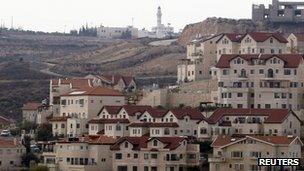Israel ends contact with UN Human Rights Council
- Published

The Palestinians have demanded an end to Israeli settlement building as a prerequisite for peace talks
Israel has cut working relations with the UN Human Rights Council, officials say, after it decided to investigate Jewish settlements in the West Bank.
The foreign ministry has reportedly told its envoy in Geneva not to co-operate with the council or with UN Human Rights Commissioner Navi Pillay.
It will also prevent a UN team entering Israel to assess the effects of settlements on Palestinian rights.
Last week, Israel said the decision to establish the probe was "surrealistic".
Negotiations between Israel and the Palestinians on a two-state solution stalled in late 2010 after a dispute over settlement construction.
About 500,000 Jews live in more than 100 settlements built since Israel's 1967 occupation of the West Bank and East Jerusalem. The settlements are considered illegal under international law, though Israel disputes this.
'Superfluous and extravagant'
Last Thursday, the Human Rights Council voted by 36 to one, with 10 abstentions, to send an independent international fact-finding mission to look into the issue.
The council said the mission would "investigate the implications of the Israeli settlements on the civil, political, economic, social and cultural rights of the Palestinian people throughout the Occupied Palestinian Territory, including East Jerusalem".
The council also called on Israel not to obstruct the process of investigation and to co-operate fully with the mission.
But on Monday, senior Israeli officials said their country's representative at the UN in Geneva had been ordered to cut off contact immediately with the council, and also to ignore calls from the human rights commissioner.
Members of the council will also not be permitted to visit Israel.
"The secretariat of the human rights council and Navi Pillay sparked this process by establishing an international investigative committee on settlements, and we will thus not work with them any more and will not appear before the council," one official told the Haaretz newspaper.
Israel is reportedly also considering sanctions against the Palestinian Authority in response to the Human Rights Council decision.
The president of the Human Rights Council, Laura Dupuy Lasserre of Uruguay, said Israel's decision was "most regrettable".
"I have no doubt that it is in the interest of Israel to co-operate with the Human Rights Council on this investigative mission, not least so that it can explain its own policies and actions to the independent commissioners once they are appointed," she added.
Last week, Israel's foreign ministry launched a withering attack on the council, saying the decision to investigate settlements was "surrealistic".
"While all over the Middle East human rights are violated in an unprecedented scale, the HRC ridicules itself by dedicating its time and resources to establish a superfluous and extravagant body," it said.
It added that the "sole purpose" of the inquiry was "to satisfy the Palestinians' whims and to harm future chances to reach an agreement through peaceful means".
The US meanwhile said the investigation would "do nothing to promote a just and lasting peace" and only serve to "push parties apart".
The Israeli authorities also did not co-operate with the fact-finding mission set up by the council following the conflict in Gaza in 2009.